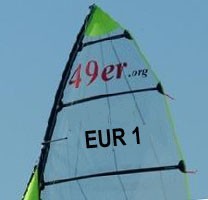EUR sailing to the Rescue of Games?
by sail-world.com/uk on 31 Mar 2008

First EUR sail number SW
The recent changes to the EU Treaty raise the question of representation of the EU at major international sporting events. With the member states of the EU put on a level similar to the individual states in America (many of which are bigger than European countries). The EU would be able to pick international sporting teams unrestricted by narrow individual nationality rules.
Important changes could be looming for the composition of the teams in future Olympic Games. The latest version of the EU Treaty includes an EU foreign policy chief (Foreign Minister) to coordinate foreign policy and represent the EU to the rest of the world from January 2009.
This move is part of a wider trend in EU external policy, which is shifting control to the EU Parliament, raising the issue of how far member states are willing to forego traditional national matters.
This latest step in the amalgamation of the political, judicial and military functions of the individual member states, builds on the earlier accepted removal of borders and the right of free movement and abode within the EU, and centralisation of many other organisations responsible for day to day matters, formally dealt with at a national level.
Leading from this creation of a United States of Europe is the interesting prospect of the representation of the EU at major international sporting events. With the member states of the EU put on a level similar to the individual states in America (many of which are bigger than European countries). The EU would be able to pick international sporting teams unrestricted by narrow nationality rules, already a difficult subject with the wide movement of population and flexible granting of citizenship within the EU anyway.
This could have considerable benefits for events such as the Olympic Games, which is bursting at the seams with countries and competitors - 10,000 competitors and 202 countries. This obesity has led to a dilution of the level of competition and the requirement for huge venues and extended rounds of heats.
With the creation of the new EU state team, some 25 individual countries would be removed at a stroke and some of the largest teams, allowing one super team - EUR - able to pick the best from the amalgamated sports authorities. At the last Games it would have placed the EUR team top of the medal counts, above the big five of; USA, CHN, RUS, AUS and JPN.
While this would have benefits for the streamlined running of international events, it may be necessary to adopt the American method of reporting such events, where they always indicate the town, state, of the competitor to maintain local support - with overseas competitors in an American event this is often rendered as Iain Percy (Southampton, England) rather than Iain Percy (GBR).
Certain sports have already moved down the EU team route. Golf is a sport that has benefited from early Europe thinking. They realised that the only way to compete against the dominance of the USA in the showpiece Ryder Cup, was to change from a GBR v USA to an EU v USA format and the rest is history.
Football is an obvious winner. Many European countries struggle to put together a suitable team, as their indigenous population lacks sufficient skilled players (England being a classic example). The logical result of English Premier teams comprised of 90% foreigners is to compete at world level with an EU team. In an EU football team, English supporters would be able cheer someone such as Wayne Rooney playing alongside the best in Europe in the World Cup against Brazil, rather than having to support a collection of nationals who struggle to hold a regular league place.
A major driving force for this change is bound to be the opportunity for the European Parliament to add another layer of unelected delegates and civil servants to organise and run the existing national sports associations. The normal route to a high EU post is following a complete cock-up in your original position, so John Prescott (former Parliamentary Croquet organiser) could well make a comeback to high office.
Sport funding would also benefit, the unaudited Europe model allows for creative spending on a level outside the wildest dreams of British organisations - Sunseeker coach boats anyone.
The ISAF is under pressure to reduce competitor numbers at the Games but also to increase the participation of more countries; perhaps the European Union is already riding to their rescue - and to save you checking, the EUR national designation is still available on the ISAF website.
If you want to link to this article then please use this URL: www.sail-world.com/43102